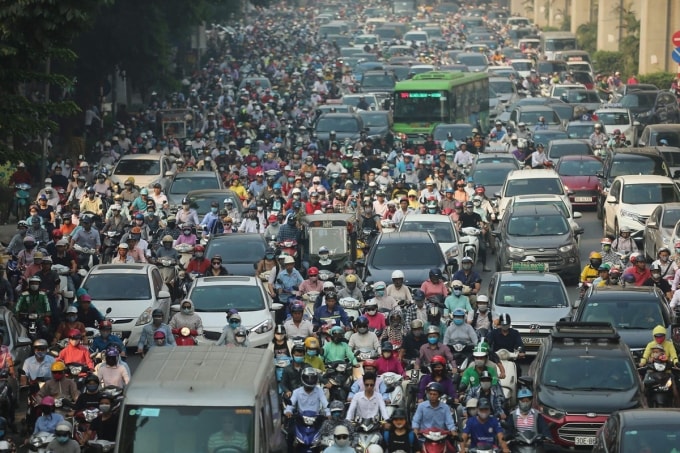Expats frenemies with motorbikes
News - PublishedTime : 06:51, 23/07/2023
Newly arrived in Vietnam, Japanese expat Akari Haraguchi instantly dropped her idea of walking three kilometers from her home to her office after her first day of work.
According to the 27-year-old expat, walking a distance of three kilometers in Japan is a piece of cake.
But in Vietnam, she had to sign up for her company’s shuttle service on her second day of work.
"There were many obstacles on the pavement, and I had to constantly avoid the honking motorbikes that wanted to overtake me," she told VnExpress. "I reached home at 7 p.m. on that day, when the temperature was scorching and the dust rose from the ground, making me feel suffocated."

Vehicles hustle on Nguyen Trai street, Ha Noi, in 2020. Photo: VnExpress/Ngoc Thanh
Motorbikes are the most popular means of transport in Vietnam: there are almost six times more motorcycles than cars across the country. According to the Vietnam Association of Motorcycle Manufacturers, a total of over 3 million motorbikes were sold in 2022, 120% more than in 2021.
This means 5.8 motorbikes were sold every minute in Vietnam in 2022.
Increasing amounts of traffic have far surpassed the speed of infrastructure development, forcing pedestrians to increasingly compete with motor vehicles for space on the road, especially in metropolitan areas.
"That makes walking in Vietnam streets really exhausting," Akari said.
And then there’s the noise pollution creating by the constant honking of motorbike horns.
Many expats still feel uncomfortable with this.
"Even when streets are so crowded nobody can move, some still press their horns as if that ‘magic sound’ can help them to move faster," said a 31-year-old American named Mark, who is working as an English teacher in Ho Chi Minh city.
But not all foreigners are negatively impressed with the motorcycling culture in Vietnam. Daniel Gold, 39, who has ridden his motorbike in around 10 countries, said he liked motorcycling in Vietnam the most.
According to the American man in the coastal city of Nha Trang, traveling with motorbikes in Vietnam is cheaper, more convenient, and more flexible than any means of transport in Western countries.
"For example, I can park my motorbike right in front of the convenience store instead of leaving my car in a giant car park," he said. "And then wandering from one side to another side to reach my destination, like what I had to do when I was in the U.S."
Another thing appreciated by both Daniel and Mark is how Vietnamese always remind them if they forget to lift their kickstands up.
"There was one time when a middle-aged man chased after me for hundreds of meters, even when I was heading the opposite direction, just to remind me to lift my kickstand up," Mark said.
"I was surprised and touched."
The expat has also gotten used to the sound of motorbike horns after living in Vietnam for six years.
Mark and Daniel both agree that motorcycles are a great means of transport as long as they do not have to ride them in urban areas.
Despite not wholly overcoming her fear of motorbikes as a pedestrian, Akari agreed with how convenient such transportation can be after participating in a motorcycle road trip with her Vietnamese coworkers. She said she was planning to learn how to ride a motorbike and use her new film camera to capture Vietnam’s breathtaking scenery to share with her family in Japan.
"I want to get away from the city every weekend," she explained. "Driving a motorbike on those getaway trips makes my experience greater than sitting in a car."
VnExpress
